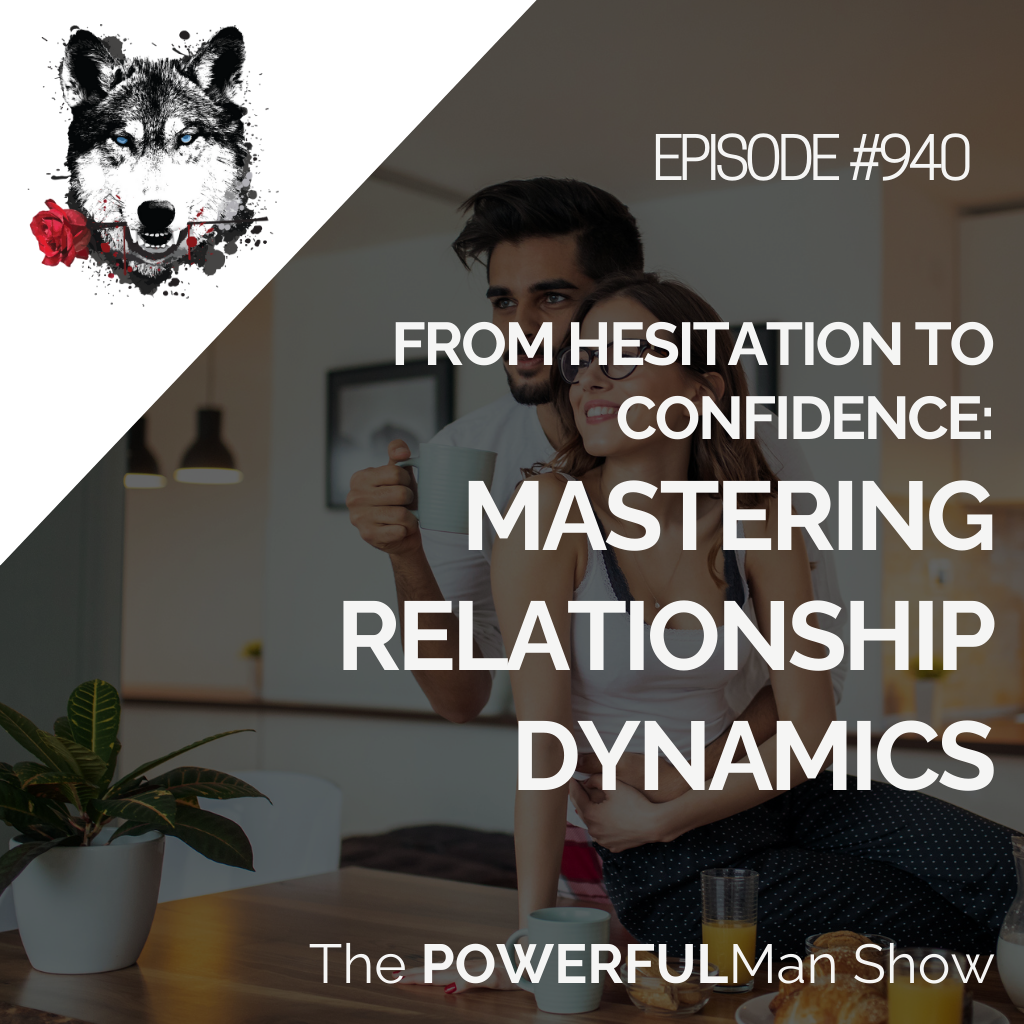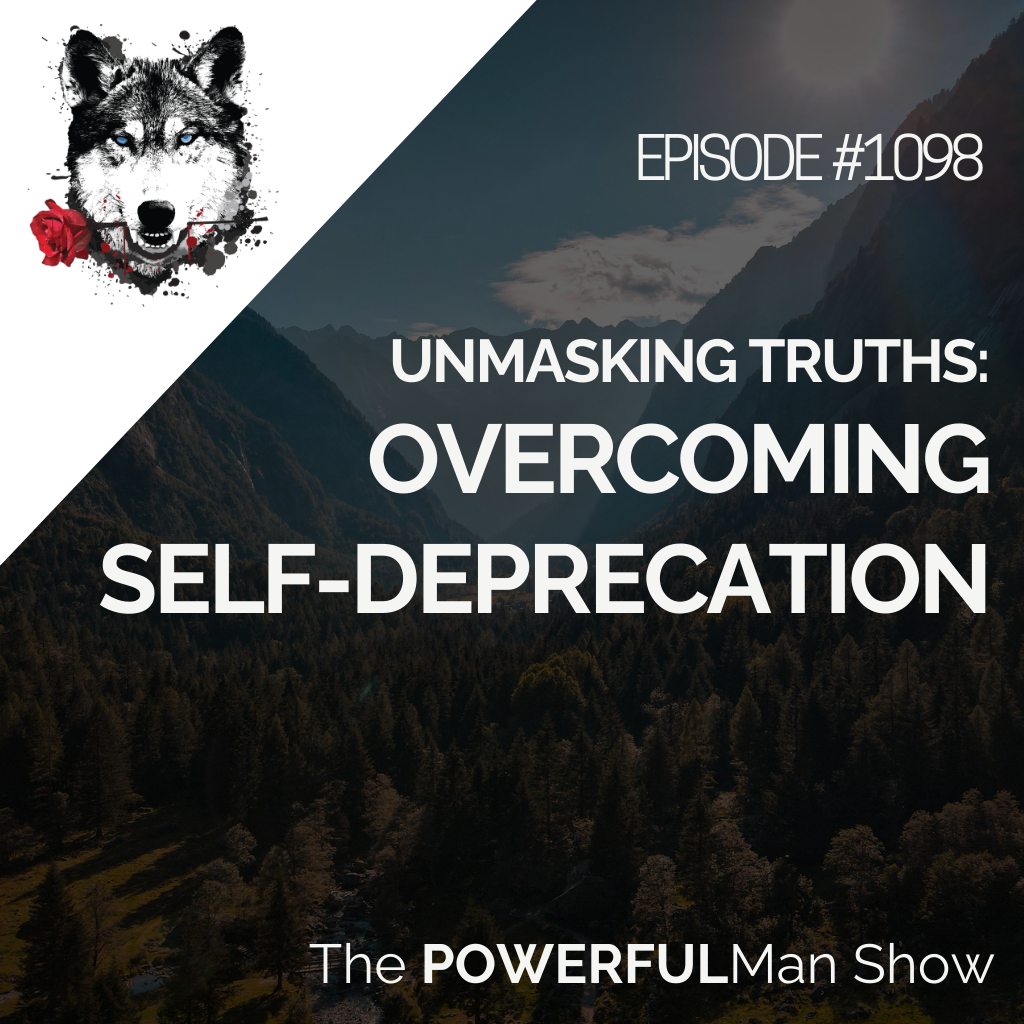Episode #940
Ever feel hesitant to ask your wife for what you truly want—whether it’s more appreciation, intimacy, or support—because you’re afraid of coming across as needy? You’re not alone. Many men struggle with this, and the way you ask can make all the difference.
In this episode, Doug and Christopher break down exactly how to communicate your needs with confidence so your wife actually wants to meet them. You’ll learn why hesitation makes your wife test you, how to avoid the “nice guy” trap, and what it really means to show up as a grounded, masculine leader in your relationship.
They dive into why your wife pushes back when you hesitate, how to make a strong request without sounding weak or demanding, and the secret energetic shift that makes a man irresistibly attractive. When you approach conversations from a place of confidence instead of expectation, your relationship changes for the better.
If you’re ready to stop second-guessing yourself and start leading with confidence, this episode is for you.
Listen now and take action!
.
Hungry for more?
Head over to our BONUS page for special access to some of the deeper tactics and techniques we’ve developed at The Powerful Man.
Also listen on:
Transcription
Doug Holt 0:00
And so she’ll push back, right? Because she’s feeling that there’s hesitation there. She’s feeling that her man, her protector, her provider, is hesitant or scared or nervous about asking or having that conversation. She is going to test to see his resolve, and if he falters and has a history of faltering or going into nice guy mode, she is going to think, This isn’t real.
It’s just like when he said, “You know what? I’m gonna go on a ketogenic diet,” and he goes on it for half a day, and then he’s eating breakfast burritos, you know, or whatever. She doesn’t trust his resolve.
Hey guys, welcome back to another episode of The TPM Show, and today we’re gonna do something special. Today we have Christopher joining us. Christopher is on the front lines—he actually receives the calls, the emails that come in from men who are struggling, guys like you who are saying, “Hey, look, I need a little help.” And Chris is one of our head advisors on the TPM staff.
Chris has culminated a bunch of questions, and we’re gonna go through some of those today. Man, thanks for being here.
Christopher 1:12
Thanks for having me, Doug. Super excited. This is, I think, my third time getting the opportunity to hop on the podcast, and it’s always just a blessing to be here. So thank you.
Doug Holt 1:23
Well, it’s great. I mean, we talked about this previously, and I know this is not what we planned on talking about, but the The Ranch is a 106-acre ranch, and we have a couple of properties here where we help men in live events. And you and your family recently relocated out here, so it’s just great having you in close proximity.
Christopher 1:39
Man, the feeling is mutual. It’s amazing. It’s a great place.
Doug Holt 1:45
So what questions do you have for us today?
Christopher 1:46
Yeah, so we’ve compiled some questions. I think the first one that I want to start with came from our Facebook group. We’ve asked the men in the Facebook group to submit some questions they thought would be good to have answered on the podcast.
This one comes from Jeremy: How do you ask for what you want without sounding or coming off as needy?
Doug Holt 2:15
Okay, so that’s a really good question. In my experience—personally, but also working with men, and from what my wife, who works with women, has told me—it’s an energetic issue. It’s the way you ask for something.
If you want to ask for what you want, and it’s truly just a desire, what I would do in this situation is go to my partner, my wife, and say, “Hey, babe, there’s something I really need to talk to you about. I feel like this is missing for me, and this is something I feel like I need.”
That isn’t needy, because the tone I use and everything else is very direct. I’m simply saying, “Hey, you’re my partner, and this is something I need, and I’m coming to you to share this.”
Where men falter—let’s go back for a second, and after this, I’ll talk about how to get into the energetic state you want to be in. But where men falter is that they come in anticipating an outcome. They have an expectation of the reaction they’re going to get. And with that hesitation in their energy, their wife can pick up on it right away.
So she is naturally, if she doesn’t like what the request is—or maybe not that she doesn’t like it, but she has some issues with it—she’s going to test to see if it’s real.
And so she’ll push back, right? Because she’s feeling that there’s hesitation there. She’s feeling that her man, her protector, her provider, is hesitant or scared or nervous about asking or having that conversation. She is going to test to see his resolve, and if he falters and has a history of faltering or going into nice guy mode, she is going to think, This isn’t real.
It’s just like when he said, “You know what? I’m gonna go on a ketogenic diet,” and he goes on it for half a day, and then he’s eating breakfast burritos, you know, or whatever. She doesn’t trust his resolve.
But when he goes in with no expectation of the outcome—when he knows that he needs this, this is something I need for me, it’s a desire, a need—and he goes with that confidence and lovingly requests this from his partner, she can tell.
And when she pushes back, he is naturally going to be grounded and say, “No, this is a need for me.” And she’s going to feel that force between them.
In my experience coaching thousands of men at this point, nine times out of ten—if not ten times out of ten—if the man is really resolved, the woman will surrender into that.
Unless it’s a really weird request, right? I mean, some guys have some really weird kinks or something they want to request that a woman’s just not down for.
A way a guy gets into that energetic state is something we call at TPM grounded masculinity. There’s a lot of breathwork that we teach our men that they can do—getting grounded, getting reassured, getting in touch with who they are, and really filling their own cup and their self-love.
We teach guys how to do this. We call it getting activated. That’s why we have something called The Activation Method. It’s a method to do this.
So getting activated, getting grounded in yourself, allows you to go into that space. My wife would say that is the sexiest thing a man can do. She’s like, “It’s not your abs. It’s not all the other stuff that we traditionally think is sexy for a woman—it’s that energetic state.”
And coming to your wife and saying, “Hey, I need this,” that is the biggest thing a man can do.
Christopher 5:51
I agree. I mean, do you feel like coming with those requests or into that conversation from that place—based on my experience with my wife—makes all the difference?
Doug Holt 6:02
Hey guys, sorry to interrupt this episode, but the reality is, if you are watching or listening to this right now, then you are looking to better yourself, and I applaud you. You’re one of my people, and I want to give you the opportunity to take massive action.
So if you haven’t joined The Activation Method yet—it’s our flagship program—do what thousands of other businessmen just like you have done and take action. Be one of the one percenters that actually does the work and takes action.
There’ll be a link in the description that will take you right to a page with more information. There’s no obligation—just go check it out and see if it’s a good fit for you.
All right, let’s get back to this episode.
Christopher 6:45
She wants to then fulfill those needs. She wants to hear those requests as long as they’re coming from that place.
Doug Holt 6:56
Yeah. I mean, think about it this way, Chris—or Jeremy or whoever’s listening to this—if your wife came to you and said, “You would make me truly happy and fulfilled in my life and make me feel completely loved and desired by you if you just did this one thing—like taking out the trash” or whatever it is, most men in their natural state, if the woman came in a very loving, feminine manner, would be like, “Heck, no problem! That’s what I want to do.”
I think men want their woman telling the other wives how amazing they are behind their back, right? We want our wives to want the same thing. Our wives want to fulfill our desires. They want to look at us as the provider or protector, to allow them to be in their feminine energy.
So if that’s the case, right? One of the ways they do that is by taking care of their man—but they don’t want to take care of a boy. Very big distinction.
And so when we go in with needy energy—imagine I think to myself, “Oh my gosh, okay, so my wife’s Aaron. If I go, ‘Man, I’m gonna ask Aaron if she can do something for me, whether it be sexual or non-sexual, whatever it is.’ But, man, she might say no. Oh, I don’t know what’s gonna happen here. Hey, babe, there’s this thing… I’m hoping you can do this for me…”—that’s a boy energy.
That’s a very nervous, not grounded, not stable energy, and that throws her off her center. She now doesn’t feel safe, so she needs to test to see if this is safe ground, and she pushes back.
That’s where guys crumble. They take it as their wife being mean, degrading, or disrespectful when really, she’s doing a safety test. She’s begging for reassurance: Is this safe for me?
But if I come in and go, “Hey, babe, something I really need you to do is make the bed in the morning. Because for me, when you make the bed and I come home after a long day of work, I feel that the house is taken care of—home base is taken care of—and that allows me to go out there and conquer more. It’s just something I need. Are you able to do that?”
And nine times out of ten—what I did there, by the way—I never blamed her for anything. I made a request, and I also told her why it was important to me. And then I asked if she had buy-in for that request.
Those four elements are really important, and guys miss those four.
I also didn’t come in with trepidation like, “Oh my gosh, okay, my wife is a stay-at-home wife. If I ask her to make the bed, is she gonna think I’m degrading her?” Because if I had said it that way, she’d be like, “Make your own freaking bed yourself,” right?
And she should.
But the way I explained it—by showing up as a man, fulfilling her boundaries and her desires as well—made a difference.
And I’m open to it. She might go, “That’s no problem, but would you mind making sure you put the toilet seat down?” Which, funny enough, is a conversation I had with my wife recently, right?
I used to think putting the toilet seat down was unfair. I’d say, “I have to put it up and down, and if I leave it down, you don’t have to do anything. That’s not really fair.”
And she said, “You know what? When you put the toilet seat down for me, it feels like chivalry. It feels like you’re doing this, like opening a car door for me, to show me that you’re my man.”
And I went, “Toilet seat down—not a problem,” right?
Totally different paradigm. She explained what that meant to her, for me to respect that request of hers.
That goes the other way too. “Hey, would you make the bed for me?” Or, “Hey, you know what makes me feel like your man? Oral. When you give me oral sex.”
Now, my wife would be much more open to honoring that request if I tell her why.
Now, she can give me pushback. I’ve got to be open to that.
If she says, “You know what? I don’t really like doing that.”
Okay. “All right, let me think about that.”
Now we have a dialogue where there’s no emotional reaction coming through.
What I used to do, Chris—this is a long time ago now—is I would have a snap reaction because I’d have an expectation coming into it.
Let’s use the blow job example. If I requested, “Hey, you know what makes me feel more like your man? When I get blow jobs from you. It makes me feel like you’re my woman, etc.”
And my wife had said something like, “Well, I don’t like doing that,” then I would go, “Well, geez, you know…” and I’d fly off the handle and get upset.
“I really need those! And if I don’t get them from you, I’m gonna get them from somewhere else!”
You know? Or something along those lines.
Then she’s going to lose respect.
She’s going to see that I’m reactionary, and I’m going to go into DEER mode.
DEER mode is something we talk about a lot.
DEER is an acronym for:
- Defend
- Excuse
- Explain
- React
And when you go into DEER mode, you are now the prey, right?
Whereas a WOLF is:
- Wise
- Open
- Loving
- Fierce
And so, when I go into that conversation without emotional charge, without caring what her reaction is going to be, I’m just going to say, “Hey, this is something I need.”
She can provide feedback on what she needs and wants, and we can have a dialogue about it.
That’s a different energy.
And it leads to a very open conversation.
Christopher 12:09
Yeah, and just staying detached from the outcome—100%, right? Engaged indifference. Yep, absolutely. Awesome question.
Doug Holt 12:17
Thanks, guys. So if you have questions and you want us to answer them on The TPM Show, just go ahead and email them to VIP@thepowerfulman.com. That’s VIP—like “Very Important Person”—at thepowerfulman.com.
Or you can post them in our free Facebook group. Josh is in there, one of our advisors, managing that for us.
And if you’re one of the lucky people, we’ve got early access to The Powerful Man app, which you can find on iTunes or Google Play. You can ask those questions in there as well.
We have a private thread now, but we’re not opening up full access until late February or early March. You can download the app now, but just know that you won’t be able to get full access quite yet. However, if you email VIP@thepowerfulman.com and request access, one of our advisors can give you an access code or put you on the waiting list.
Guys, make it a great day. And as I always say—in the moment of insight, take massive action.
We’ll see you next time on The Powerful Man Show.


-Feb-04-2026-07-39-18-8916-PM.png)
